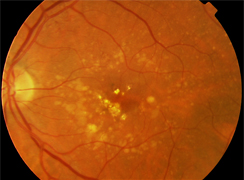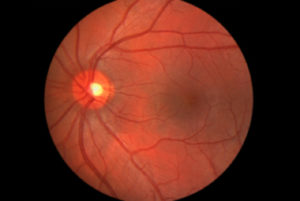Age-Related Macular Degeneration, also known as ARMD, is a disease where the macula begins to deteriorate causing a loss of central vision. The macular is responsible for seeing fine details for tasks such as reading, driving, or recognizing faces. With ARMD, images will look blurry, distorted, or missing.

Age-Related Macular Degeneration in Boca Raton & Palm Beach Gardens, FL
Although the exact cause is still unknown, age, as the name implies, is the greatest risk factor for developing ARMD. People over the age of 60 are at the greatest risk. It more often affects women more than men, Caucasians and lightly pigmented people (with light hair, skin and eyes), and those who have a family history of ARMD.
There are two types of ARMD: Dry and Wet.
|
|
Treatment:There is not cure or current treatment for dry ARMD. Patients at risk should be dilated annually or if a sudden change in vision occurs as patients with Dry ARMD have the potential to turn into its more severe counterpart, Wet ARMD. |
Treatment:There are now many methods to treat wet ARMD being studied. The newest involves the injection in to the eye of cell inhibitors called Anti-VEGF drugs. These medications can be sight saving if treatment is started soon after diagnosis. Patients with “wet macular degeneration” require continued monitoring for the rest of their life to prevent severe irreversible vision loss. |
Prevention Efforts
If you have a family history of ARMD or have recently been diagnosed with the disease, it is important to have a dilated eye examination once a year.
It is also important to monitor your vision for any changes by using an Amsler Grid. If you have been diagnosed with ARMD, you should notify our office if you notice any change in your vision. It is very important not to delay treatment.
Clinical research has shown that vitamin supplements may be beneficial in some but not all cases of macular degeneration. It is important to talk with your eye doctor before starting vitamin supplements.


